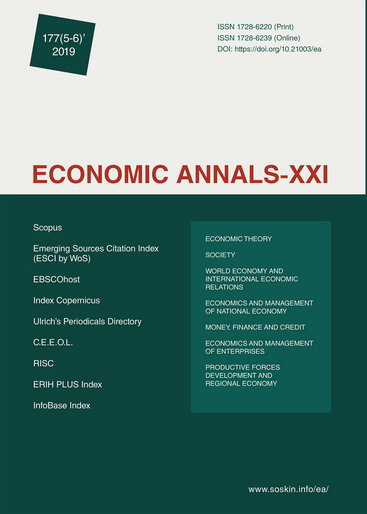Factors of rural development in the context of decentralisation: empirical research
Factors of rural development in the context of decentralisation: empirical research
Author(s): Viktoriia Medvid, Viacheslav Pylypenko, Nadiia Pylypenko, Tetiana Ustik, Nataliia Volchenko, Mykola VashchenkoSubject(s): Agriculture, Rural and urban sociology
Published by: Institute of Society Transformation
Keywords: Community Development; Administrative and Territorial Reform; Socio-economic Development; Rural Areas; Rural Communities;
Summary/Abstract: The purpose of this research is to analyse the impact of demographic and socio-economic factors on the assessment of the directions of rural area development in the context of the administrative and territorial reform in Ukraine. This article is based on the analysis of the results obtained in the course of a sociological survey conducted by the authors in 2018 concerning residents of the Znob-Novgorod United Territorial Community (UTC) of Sumy region in order to identify problems and development priorities when elaborating the Development Strategy for the period 2019-2025. Three age groups were identified: up to 35 years old (29.7%), 35 years old to 60 years old (52.4%), and over 60 years old (17.9%), which reflects all major age groups of UTC residents. Young people and seniors are more positive about life in the community, as the main responsibility for solving economic and domestic problems lies with middle-aged people. The share of positively adjusted respondents is growing, with the increase in the level of income received from the minimum to the average in the region. A number of problems, such as environmental, infrastructural and educational issues, are of greater concern to middle-aged people than to young people and older generations. Persons with a higher level of education, in comparison with other major problems, consider insufficient social initiative and activity of inhabitants, low income of the population, a lack of investments, an unsatisfactory condition of roads, a poor quality of medical services to be major problems. For people with a low level of education believe the problems of alcoholism and drug abuse are much more urgent. On the whole, the population is more focused on finding an external resource - most of the answers received regarded available natural resources (more than 40%), while problems related to progressive and efficient local authorities were reported by 16.6%. Only one out of nine respondents realised that the main resource for development is the inhabitants themselves, their activity and entrepreneurship. This is least understood by middle-aged people with incomplete higher education, those who are either self-employed or unemployed, and those with low income. The residents of the community give more priority to the economic directions regarding the development of social, cultural and environmental projects. The results of the analysis of the sociological survey showed the existence of the demographic and socio-economic factors impacting the determination of priority directions aimed at social development and the willingness to take an active part in their implementation. The results of the analysis are logical, however some of them, due to their ambiguity, require further research in territorial communities that have similar conditions of their development and problems.
Journal: Економічний часопис - ХХІ
- Issue Year: 177/2019
- Issue No: 05+06
- Page Range: 126-140
- Page Count: 15
- Language: English

